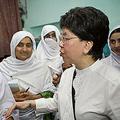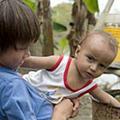 聯合國世界衛生組織(WHO)於1948年4月7日成立,因此將當天訂為世界衛生日。聯合國重要官員於世界衛生日(7日)提出警告,全球暖化使氣溫與海水溫度升高,同時也造成了極端氣候的出現;全球暖化不僅危及地球,也威脅了人類的健康。
聯合國世界衛生組織(WHO)於1948年4月7日成立,因此將當天訂為世界衛生日。聯合國重要官員於世界衛生日(7日)提出警告,全球暖化使氣溫與海水溫度升高,同時也造成了極端氣候的出現;全球暖化不僅危及地球,也威脅了人類的健康。
世界衛生組織總幹事陳馮富珍(Dr. Margaret Chan)表示,「我簡要地表達我主要關切的部分—氣候變遷危及了人類的健康。」「地球的暖化現象是逐步的,但極端天候,如為數更多的暴風雨、洪水、乾旱與熱浪的產生,卻將是突然且劇烈的。」
陳馮富珍指出某些易受氣候影響的疾病,造成每年分別有超過350萬人營養失調、180萬人死於腹瀉與100萬人死於瘧疾,人類正面臨這些疾病的危害。陳馮富珍表示,「雖然氣候變遷是一種全球性的現象,但其造成的影響,分布地區並不平均。簡而言之,氣候變遷甚至讓那些形成嚴重影響的問題繼續惡化,且多數都集中發生在發展中國家,使得狀況更加難以掌控。」
近來的氣候異象,如2003年歐洲的熱浪、2005年重創美國的卡崔娜颶風、以及孟加拉瘧疾的流行等,僅為未來可能產生異象的一小部分。
陳馮富珍補充,「這些趨勢與事件不能只歸咎於氣候變遷,但卻是伴隨氣候變遷而來的一些更頻繁且劇烈的挑戰。許多地區在衛生資源方面已面臨沉重的壓力,而這些現象將對其造成進一步的緊迫。」
為了因應氣候變遷對健康造成的影響,WHO協調且支持最佳解決方案的研究與評估,其主要目的是為保護人民的身體健康,特別是針對發展中國家的婦女與孩童等弱勢族群。
 WHO對會員國提出建議,為了保護他們的人民,則必須改善衛生系統;並且為了適應氣候變遷、與減少氣候變遷對於人體健康的影響,會員國之間在未來將進行合作,發展有效的應變措施。
WHO對會員國提出建議,為了保護他們的人民,則必須改善衛生系統;並且為了適應氣候變遷、與減少氣候變遷對於人體健康的影響,會員國之間在未來將進行合作,發展有效的應變措施。
聯合國兒童基金會(UN Children's Fund, or UNICEF)執行長威妮曼(Ann Veneman)表示,「每年近100萬名5歲以下的兒童死因,是多數可預先避免的疾病,包括瘧疾與腹瀉,此兩種疾病對於氣溫和降雨的改變相當敏感,若天氣型態改變,將可能成為常態。」
婦女與兒童較易受颶風與洪水所影響,而據氣候變遷專家所示,此兩種現象的強度與頻率將在未來進一步增加。天災所致之家園、學校與健康中心的毀損,則減少一般家庭可獲取的資源。
UNICEF表示,「我們必須聽取婦女與兒童的聲音,並加以評估其需求,這也必須是國際社會回應環境預期改變的一部分工作;這些人必須擁有獲得相關知識與工具的管道,這也是可以保護他們本身與所居社群的必要協助。」
Bringing a rise in air and sea temperatures and extreme weather patterns, global warming endangers not only the planet but also threatens human health, top United Nations officials warned on Monday - World Health Day - which marks the founding of the UN World Health Organization on April 7, 1948.
"The core concern is succinctly stated - climate change endangers human health," said Dr. Margaret Chan, director-general of the World Health Organization, WHO.
"The warming of the planet will be gradual," she said, "but the effects of extreme weather events - more storms, floods, droughts and heat waves - will be abrupt and acutely felt."
She noted that human beings are already exposed to the effects of climate-sensitive diseases, including malnutrition, which causes over 3.5 million deaths per year, diarrheal diseases, which kill over 1.8 million people a year, and malaria, which kills almost one million people every year.
"Although climate change is a global phenomenon, its consequences will not be evenly distributed," said Dr. Chan. "In short, climate change can affect problems that are already huge, largely concentrated in the developing world, and difficult to control."
Recent events such as the European heat wave in 2003; Hurricane Katrina, which struck the United States in 2005; and cholera epidemics in Bangladesh are just a few examples of what can be expected in the future.
"These trends and events cannot be attributed solely to climate change but they are the types of challenges we expect to become more frequent and intense with climate changes," Chan said. "They will further strain health resources which, in many regions, are already under severe stress."
To address the health effects of climate change, WHO is coordinating and supporting research and assessment on the most effective measures to protect health, particularly for the most vulnerable such as women and children in developing countries.
WHO is advising member states on the changes they must make to their health systems to protect their peoples, and will work with them in the future to develop effective means of adapting to a changing climate and reducing its effects on human health.
"Nearly 10 million children under age five die every year of largely preventable diseases," said Ann Veneman executive director of the UN Children's Fund, or UNICEF. "Many of the main global killers of children - including malaria and diarrhoea - are sensitive to changes in temperature and rainfall, and could become more common if weather patterns change."
Women and children tend to be most affected by hurricanes and flooding, which climate change experts say will increase in intensity and frequency in coming years. The destruction of homes, schools and health centers resulting from natural disasters reduce services available to families.
"The voices of women and children must be heard and their needs assessed as part of the international response to prospective changes to the environment, and they must have access to the knowledge and tools necessary to protect themselves and their communities," UNICEF said.
全文及圖片詳見:ENS


